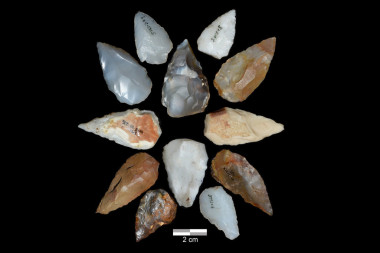Fossil Trove From 74,000 Years Ago Points to Remarkably Adaptive Humans
An archaeological site in Ethiopia revealed the oldest-known arrowheads and the remnants of a major volcanic eruption.
In 2002, a crew of paleoanthropologists were working in northwestern Ethiopia when they came across chipped stones and fossilized animal bones — telltale signs of a place where ancient people had once lived.
After years of excavations, the researchers discovered that hunter-gatherers had indeed lived there 74,000 years ago. As described in a study published Wednesday in Nature, these ancient humans were remarkably adaptable. They made arrows to hunt big game. And when their world was turned upside down by a giant volcanic eruption, they adapted and survived.
That flexibility might help explain why humans of the same era successfully expanded out of Africa and settled in Eurasia, even when many earlier forays had failed. “This points to how sophisticated people were in this time period,” said John Kappelman, a paleoanthropologist at the University of Texas who led the new study.
